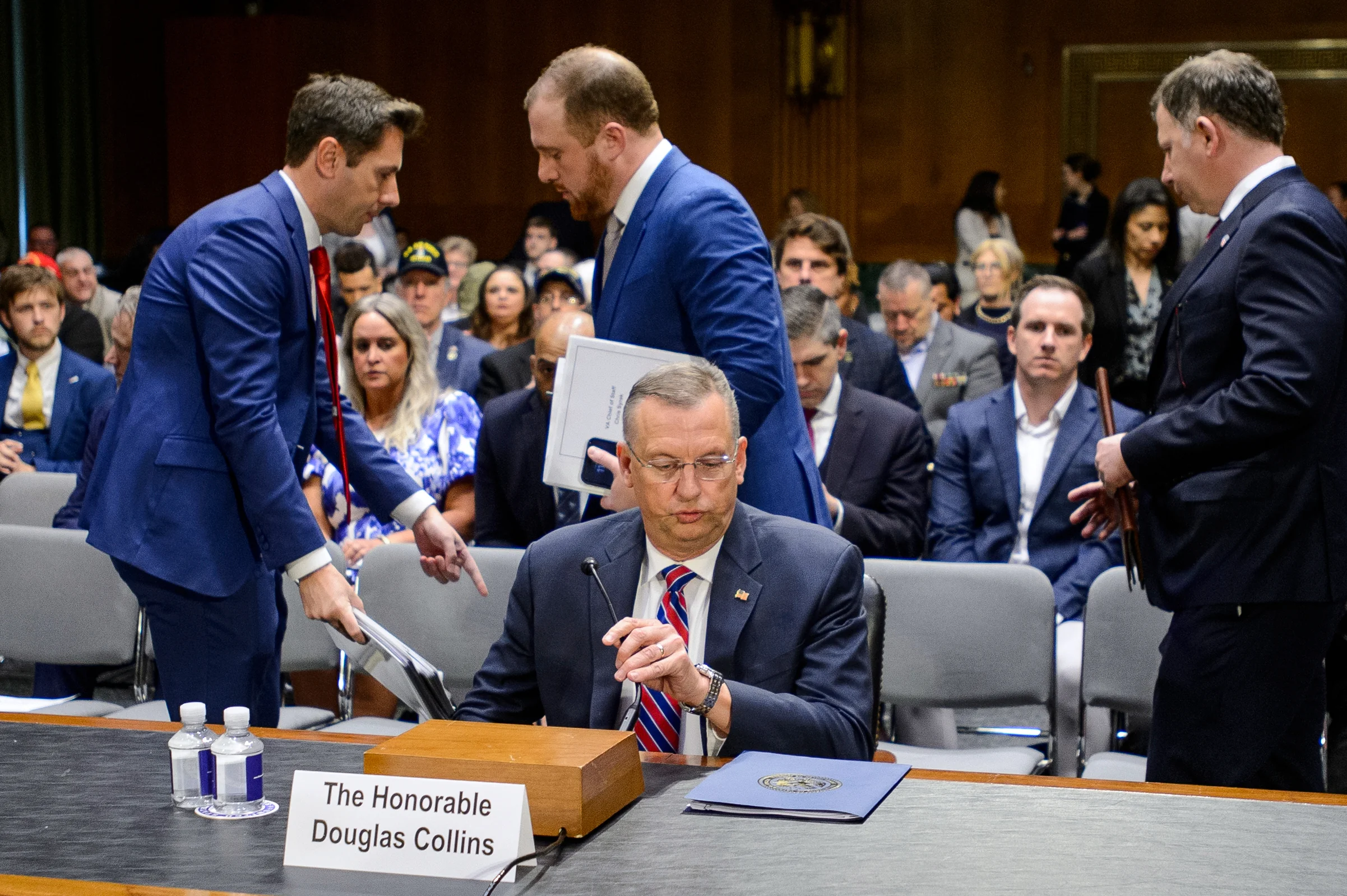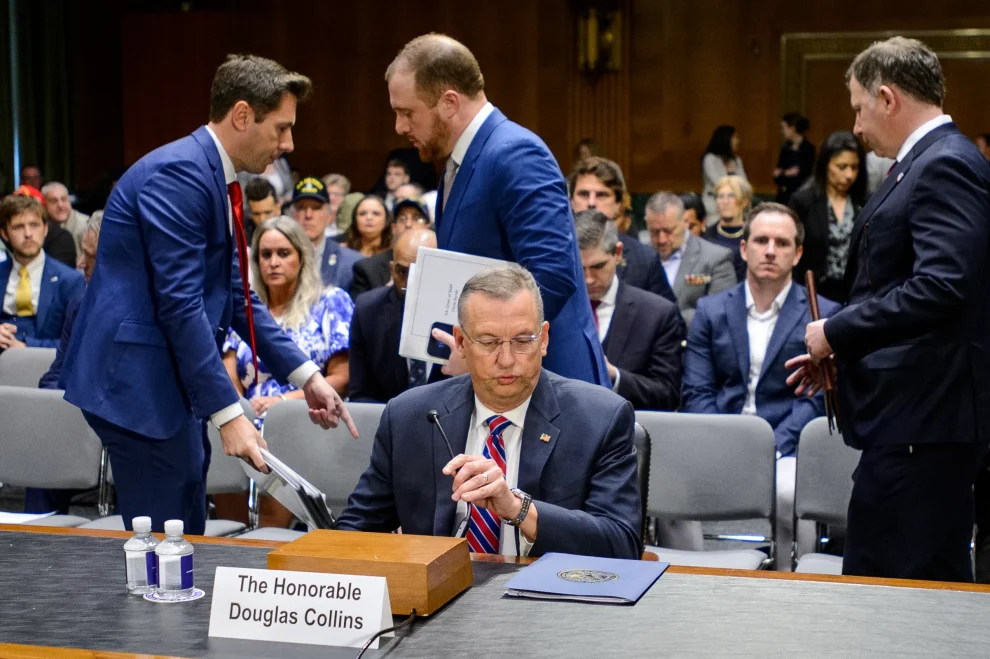Veterans Affairs Secretary Doug Collins told senators Tuesday that downsizing the VA workforce is essential to reforming a bloated system, despite bipartisan concerns that the plan lacks transparency and could jeopardize care for veterans.
Collins defended the downsizing as a push to eliminate waste and refocus resources on front-line care. He also stressed that the 15% workforce reduction is a preliminary goal but not a final target.
“This review is aimed at finding ways to improve healthcare and benefits for veterans without cutting care and benefits,” Collins said in his testimony. “We’re going to maintain VA mission-essential jobs like doctors, nurses, claims processors, while phasing out nonessential roles. This is savings we can achieve that will be redirected to veteran healthcare and benefits.”

Tuesday marked Collins’s first testimony before Congress since taking office in February as pressure mounts from veterans groups and federal employee unions over his proposal to cut up to 80,000 positions from the VA’s more than 480,000-member workforce. The agency initiative, focused on reverting to its 2019 staffing levels, is part of a broader federal effort to streamline government operations and reduce bureaucracy, headed up by Elon Musk’s Department of Government Efficiency.
Senators from both parties questioned whether the department had done the legwork to justify such sweeping reductions. Committee Chairman Jerry Moran (R-KS) urged Collins to take a data-driven, collaborative approach focused on improving veteran care while honoring the contributions of VA employees.
“I think how this process is completed, or how this process occurs, is hugely important, and I have told you on the phone that it ought not be a set number that you’re trying to reach,” Moran said in his opening remarks. “It ought to be about right-sizing the Department of Veterans Affairs.”
The Kansas senator also raised specific concerns about the VA inspector general vacancy, emphasizing that reinstating a permanent one is a high priority after Trump fired 17 inspectors general, including the top watchdog at the VA.
Moran requested that Collins and the administration prioritize the nomination and installation of a permanent VA inspector general as part of the department’s accountability and reform efforts.
Collins confirmed that the next step is for Trump to nominate a replacement and reiterated that he supports the return of the inspector general.
“So from our perspective, we welcome the oversight to make sure that we’re heeding the metrics that we need to do to take care of veterans,” Collins said.
Democrats highlighted rising backlogs, canceled contracts, and reports of confusion among VA staff members, warning that the cuts appeared rushed and poorly communicated.
“We need to avoid the potential disaster that is looming,” said Sen. Richard Blumenthal (D-CT), the ranking member of the Senate Armed Services Committee. “And make no mistake, it is a disaster that is on the horizon approaching us as surely as a thunderstorm in the nation’s capital, and we need to avoid it.”
Blumenthal mentioned 19 letters he wrote and 21 other inquiries from colleagues that remain unanswered.
The hearing grew tense as heated exchanges erupted between Collins and Democratic senators challenging his proposed reforms.
Sen. Tammy Duckworth (D-IL), a combat veteran, raised alarm over the impact of the staff cuts on the VA’s ability to process claims under the PACT Act — a landmark 2022 law signed by former President Joe Biden that significantly broadened benefits for veterans exposed to toxic substances.
In anticipation of a surge in claims from newly eligible veterans, the VA significantly ramped up hiring, with the Veterans Health Administration expanding its workforce by 5.5% in 2023. Since the PACT Act was enacted, the department has screened 5.6 million veterans for toxic exposures and enrolled over 740,000 new patients in VA healthcare, according to a September 2024 performance dashboard.
“I do think it’s important to acknowledge that we did sign up just in the first year of the PACT Act alone, a million veterans, so that increase in personnel is also to deal with the increase in veterans coming to VA for care, long overdue for their acts because of their exposure to toxic substances,” Duckworth said.
“We also lost about 400,000 veterans that year as well, so it does even out,” Collins said in response.
Sen. Maggie Hassan (D-NH) expressed deep concerns regarding the workforce reductions, highlighting that scaling back to pre-PACT Act staffing levels could undermine the department’s capacity to serve the increased number of veterans now eligible for benefits.
“Do you want to reach your goal or not?” Hassan questioned, raising her voice.
“A goal is not a fact,” Collins responded.
“Most people, when they state a goal, decide they’d like to reach it,” Hassan said. “If you don’t want to reach 80,000, revise your goal and tell us what you want to do. Talk to us about the analysis you perform — you’ve got a lot of knowledgeable people on both sides of this aisle that want to serve veterans.”
“The VA is not working in the way that it should work,” Collins said. “I am trying to get it to a point where it can work for all veterans, and the workforce is a part of that.”
Although Collins stressed that no doctors or front-line providers have been dismissed and promised to safeguard those critical roles, Democrats pushed back, warning that cutting key positions such as schedulers and support staff would still jeopardize veterans’ ability to access timely care.
“There’s no universe where all 80,000 positions are DEI staff or interior designers,” said Sen. Elissa Slotkin (D-MI), challenging Collins’s characterization of the targeted jobs.
Sen. Thom Tillis (R-NC) expressed an openness to any plan that improves care and access for veterans, even if it causes discomfort. But the North Carolina senator pressed Collins to provide clarity on which positions are being considered for elimination and stated he could not support the cuts unless a rescissions package is sent to Congress.
“I don’t believe cuts are real unless there’s a rescissions package sent to the U.S. Congress so that we codify those cuts,” Tillis said. “When I see that rescissions package, if it’s at odds with what I consider to be in the best interest of the VA, I may vote against it.”
VA COMMITTEE CHAIR ASKS DOJ TO REVIEW UNNEEDED $3 BILLION BIDEN-ERA FUNDING PLEA
Collins responded that the VA is conducting a careful, step-by-step review of its 470,000-person workforce to identify inefficiencies and eliminate unnecessary bureaucracy, but he emphasized that no fixed number of layoffs has been decided.
The White House has put forward a budget plan that boosts program funding for veterans by 4% for the coming fiscal year, despite looming reductions in staffing and contracts.
























